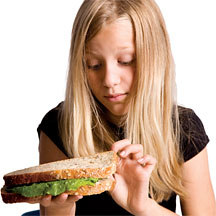Dealing With the Picky Eater
By Claudia Anrig, DC
Many parents have a daily challenge that goes something like this: "My kids are picky eaters." Often, this challenge boils down to their children's tendency to avoid vegetables, but it can include avoidance of numerous other foods - usually the healthy variety. What's the solution? While there really isn't a single easy answer, much of this challenge actually stems from your
own relationship with food, meaning that many of your childhood habits have persisted into adulthood and are now being passed on to the next generation.
Why It's Happening
 Your child enters this world not knowing what they hate or love about food; for the most part, kids learn by example. If you hate vegetables and never eat them, chances are your children won't be very willing to try vegetables - and you may be not be particularly interested in serving them. After all, you'll want to serve the foods you generally eat. If you're a well-balanced, healthy eater, you're on the right track, but it doesn't necessarily mean you won't have some picky-eater challenges to deal with. However, if you're a picky eater stuck on a fairly limited number of not-so-good-for-you foods, you're creating the consummate unhealthy picky eater by your actions, perhaps without even realizing it.
Your child enters this world not knowing what they hate or love about food; for the most part, kids learn by example. If you hate vegetables and never eat them, chances are your children won't be very willing to try vegetables - and you may be not be particularly interested in serving them. After all, you'll want to serve the foods you generally eat. If you're a well-balanced, healthy eater, you're on the right track, but it doesn't necessarily mean you won't have some picky-eater challenges to deal with. However, if you're a picky eater stuck on a fairly limited number of not-so-good-for-you foods, you're creating the consummate unhealthy picky eater by your actions, perhaps without even realizing it.
What You Can Do: 9 Strategies
1. Start With You. Where do you begin? It starts right now, whether you're already a parent or expecting your first child. Start by reviewing your personal relationship with food. Consider how you and your significant other will blend or create new food relationships, and expand your knowledge or cooking base by researching books and Web sites that take a wellness approach to raising healthier children. This is all part of developing a clear strategy for raising your family. It includes the family's moral compass, discipline and education, of course - and a snapshot of your family in terms of "what in our background could create food issues for our kids," and the nutritional lifestyle that will grow and fuel your children's development.
2. You're the Motivator. If you've already created a picky eater, don't be nit-picky with them (remember, it was you who unintentionally contributed to their picky eating habits). Start by reviewing a week in the life of your family and what everyone eats and drinks, and then divide your dietary lifestyle into two categories: Wellness/Healthy or Processed/Packaged/Unhealthy. Then add a third column, New Strategy, where you can add food items that will help the family get where it needs to go in terms of better eating habits. Evolve your family into the healthier lifestyle, and remember, the motivation has to come from you first.

